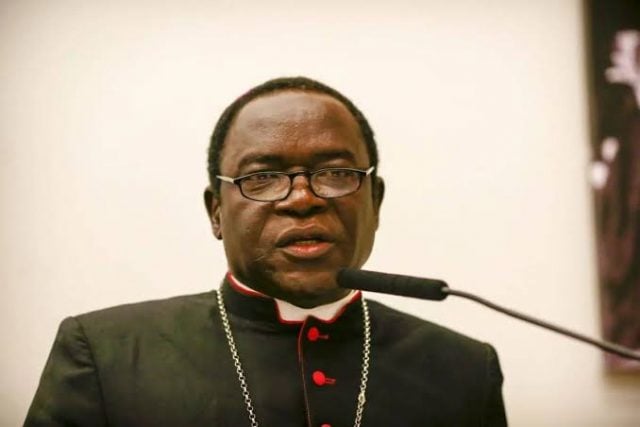
DANGOTE REFINERY: PENGASSAN CONFLICT COULD DETER INVESTORS, KUKAH CAUTIONS
BY MUNIRAT BALOGUN
The Bishop of the Catholic Diocese of Sokoto, Mathew Kukah, alongside a consortium of distinguished Nigerians, has called for moderation in the labor conflict involving the Dangote Refinery and the Petroleum and Natural Gas Senior Staff Association of Nigeria.
In a collaborative statement released on Tuesday, Kukah and twelve additional signatories expressed that although governmental mediation and renewed negotiations have alleviated the immediate crisis, the situation has exposed vulnerabilities to investor trust and initiatives to restore domestic refining capabilities.
They cautioned against any industrial actions that could compromise supply chains, emphasizing that concerns regarding legitimate competition and monopolistic practices should be resolved through regulatory bodies rather than through strikes.
According to media, their appeal follows a statement made on Monday by Bayo Ojulari, the Group Chief Executive Officer of the Nigerian National Petroleum Company Limited, who attributed the dispute to shortages and elevated cooking gas prices.
The statement highlighted that the Dangote Refinery has commenced alleviating supply pressures, presenting a framework that enhances local productivity and reduces costs.
Kukah and his colleagues stated, “We, the undersigned, express concern regarding the recent conflicts and disruptions associated with the Dangote Refinery. Although the immediate crisis has subsided due to government intervention and re-engagement between labor and management, this incident offers crucial insights for Nigeria’s economic trajectory.
“For many years, Nigerians have suffered from the downfall of state-owned refineries, the wastage of trillions of naira on subsidies, and reliance on fuel imports. These failures have left the populace vulnerable to scarcity, inflation, and insecurity. In this scenario, the Dangote Refinery embodies more than just a commercial endeavor; it serves as a national emblem of what courageous domestic investment can accomplish.
“Significantly, the refinery has begun to mitigate supply pressures, evidenced by a decrease in petrol prices in certain regions from approximately ₦1,500 per litre to around ₦820—a reduction of 55%. This effect on transportation costs and food pricing provides Nigerians with a glimpse of how improved local productivity can enhance everyday life. It also communicates to both domestic and international investors that actual industry, rather than mere speculation, can prosper in Nigeria.
“Nevertheless, the strikes and threats accompanying this transition convey inappropriate messages. Industrial conflicts, if mishandled, jeopardize the interest of both local and foreign investment at a time when Nigeria urgently requires capital and innovation. A refinery of this magnitude is a national lifeline, significantly impacting employment, energy security, and inflation. ”
The list of signatories comprises educational leader Abubakar Siddique Mohammed, activist Aisha Yesufu, economist Arunma Oteh, investment banker Atedo Peterside, and Dr. Salamatu Hussaini Suleiman, ECOWAS Commissioner for Political Affairs, Peace, and Security.
They emphasized that the rights of workers to organize and negotiate must be upheld, and these rights should not be wielded to hold the economy hostage.
They also demanded transparency and social accountability from large investors.
“Workers’ rights must be honored. The Constitution guarantees the entitlement to organize and to seek equitable treatment. No business can succeed without engaged, fairly treated employees. ”
Markets and productivity must be preserved. The right to assemble cannot transform into a justification for immobilizing the economy. Productive enterprises that reduce expenses and generate employment opportunities must be protected.
“Social responsibility and accountability should remain fundamental. Investors of this scale are expected to operate with transparency, uphold equitable labor practices, and reinvest in the communities they support,” the statement partially remarked.
Additional participants in the group include Labour Party national women leader Dudu Mamman Manuga, Ibrahim Dahiru Waziri, Khalifa Muhammad Sanusi II, Sarkin Kano, Obonganwan Barbara Etim James, Opeyemi Adamolekun, Osita Chidoka, and Senator Sola Akinyede.
PENGASSAN recently halted operations at vital oil and gas facilities due to allegations that Dangote refinery terminated 800 employees who joined the union. However, the Dangote refinery contended that it only dismissed a limited number of workers who were sabotaging operations, asserting that this action was part of the company’s restructuring efforts.
In response, oil and gas workers initiated a strike to advocate for their colleagues, leading to significant losses in oil and gas production and a decline in power generation nationwide.
The intervention of the Federal Government reinstated normalcy as PENGASSAN called off the strike on Wednesday after the Dangote Group was instructed to reassign the dismissed employees to alternative business units.
Despite the strike’s suspension, which resulted in long queues at filling stations, the price of cooking gas has not reverted to approximately N900 per kg, remaining at N2,000 in Lagos and other regions as of Monday.
